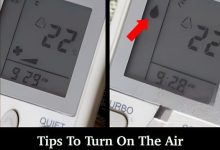Winter is coming, so it’s necessary for you to protect your possessions from the ravages of Old Man Winter (or risk costly repairs in the spring.)
Swap Out the Gas in Small Engines

Standard gas at the pump can gum up a carburetor on a small engine in just a few months. To avoid this, suck the gas out of the tank with a turkey baster and run the engine dry. Then add a bit of non-oxygenated gas, which has a longer shelf life but is too expensive to burn all year. You can also add a splash of fuel stabilizer and run the engine for a while on the good stuff before storing it.
Cut the Power to Your AC

Cut the power to your central air conditioner before the weather turns frigid. Your compressor could be damaged if your AC accidentally gets turned on in low temperatures. Also, some AC compressors have a crankcase heater to keep the oil warm. Running this heater in the winter wastes money and the warmth could attract mice.
Flip off the breaker if your AC compressor has a dedicated circuit, or rotate the disconnect block upside down into the “off” position. The disconnect block is located outside in a small panel near the compressor. Reenergize the unit 24 hours before startup. That gives the oil time to reach operating temperature.
Disconnect Garden Hoses

A garden hose left connected to a spigot traps water inside. When that water freezes, it can bust open the spigot, the hose or both. Sometimes even the pipe behind the spigot bursts and sprays hundreds of gallons inside the house. This can happen even with a frost-proof spigot and even with the water supply turned off, so always disconnect garden hoses before winter arrives.
Winterize Your Pressure Washer

There are a few things you should do before putting away your pressure washer for the winter. First, make sure all water is drained from the pump. Second, disconnect all of your hoses and spray an antifreeze into the pump. Taking these steps will ensure that your pressure washer makes it through the winter and works like a charm next spring.
Protect the A/C Compressor

You shouldn’t wrap your entire air conditioner for the winter. Many manufacturers advise against it because it can invite rodents and cause condensation, which can lead to early corrosion. But you should consider setting a piece of plywood on top of the unit to protect the fan from damage caused by falling icicles. And see our maintenance guide to learn how to clean your air conditioners in the spring.
Lube Your Car in 4 Critical Places

When the calendar calls for cold weather, get your car ready for winter driving: lube locks, latches, hinges, window channels and weather stripping. Proper lube can prevent binding and freezing and save you the cost of a busted regulator. You can lube your entire vehicle in less than 20 minutes. All you need is dry Teflon spray, spray lithium grease, a rag and glass cleaner.
Start with the window channels. Lower the window glass and shoot dry Teflon spray down the front, rear and top window channels on each door. Soak the channels. Then run the window up and down several times to spread the lube. Finally, raise the window and clean off any overspray with glass cleaner.
Then shoot the door and trunk/hatch lock cylinders with dry Teflon spray. Use the spray straw to force the lock ‘door’ open. Then inject a quick shot into the lock cylinder. Insert your key and rotate the lock to spread the lube.
Next, coat all the weather stripping with dry Teflon spray. Then spread it with a cloth. Finish the job by lubing the hood, trunk or tailgate latches with lithium grease. Then spray the door hinges. Operate the latches and doors several times to spread the grease.
Drain Garden Hoses

Don’t neglect to drain garden hoses before putting them away for the winter. Usually, it’s not a problem and you can get away with storing your hoses in the winter with small amounts of water still inside. But every once in a while freezing water splits a hose open. That’s just wasted money because draining hoses takes little time and effort: Blast out the water with an air compressor or stretch them out on a sloped yard or driveway.
Switch to Winter Wiper Blades
The season’s first winter snowstorm hits and you turn on the wipers. The blade supports get packed with snow and the wiper blade either cause streaks or misses large swaths of your windshield. Regular blades often become clogged with snow and ice. The rubber covering on winter blades prevents that problem. A rubber boot encloses the entire blade and prevents ice and snow from sticking or packing. They make for much better visibility and safer winter driving.
Clean Attic Venting

Poor attic ventilation can cause ice dams in the winter months and increase cooling costs, create a home for mold and reduce the life of shingles during the dog days of summer. Over time, the vents located in your soffits and on some gable-end walls get clogged with dust and debris and lose their effectiveness. Clean them with a leaf blower or compressed air. You could use a pressure washer, but make sure you stick to just a couple of quick passes because you don’t want to saturate the attic insulation with water. Clean your vents every few years, unless you live near a lot of trees with floating seeds, which can clog vents in one season.
Check Your Chimney or Risk a Fire

Creosote buildup causes chimney fires. You should have your chimney professionally inspected or cleaned after every 70 fires. If you burn wet wood (which you shouldn’t), have it inspected or cleaned every 50 fires. Don’t remember the last time you had it cleaned by a pro? A quick way to tell if your chimney needs cleaning is to run the point of your fireplace poker along the inside of your chimney liner. If you find a 1/8-in. layer (or more) of buildup, call a chimney sweep.
Winterize Your Sprinkler System

You don’t have to pay someone to blow out your sprinkler system. You can do it with your own compressor, but be aware that even the largest home compressor isn’t powerful enough to blow out the entire system at once. If you like number crunching and you have the original irrigation layout showing the gallons per minute (GPM) of each sprinkler head, divide the GPM of each zone by 7.5. That’ll give you the cubic feet per minute (CFM) you need to blow it out. Otherwise, rent a 10-CFM compressor and hose from a tool rental center.
- Set the compressor air pressure regulator to a maximum of 80 psi for rigid PVC pipe systems, or 50 psi for flexible black polyethylene pipe.
- Then turn off the water supply and set the system timer to open just one zone.
- Next, open the manual drain valve at the end of that zone (if equipped).
- Then, connect the air line to the blow-out port, as shown. Close off both valves on the backflow preventer.
- Then remove the plug on the blow-out port and screw in a quick-connect hose adapter.
- Snap on the air hose and connect the other end to the compressor. Now blow out the line. The heads should pop up and spit out water.
- Disconnect the hose as soon as they run dry.
- Don’t overdo the blow-out — without water cooling the plastic gears, they can melt in less than a minute.
- Move on to the next zone and allow the heads to cool.
- Then go back and blow out each zone a second time.
Empty Flower Pots
You might think it safe to put away your flower pots for the winter with the soil still inside them. It’s a much better idea to empty them out first, though. If the soil isn’t dried out the moisture inside of it could expand as it freezes and ultimately crack your pots. Especially consider emptying your flower pots if you plan to leave them outside and uncovered all winter.
Winterize Your Gas Grill

If you’re not a winter griller, pack away your grill now, before it’s covered with a foot of snow. In addition to giving your grill a thorough cleaning to remove grease and food scraps, take these steps to help prevent any unpleasant surprises when you fire up your grill again next spring.
Shut off the gas at the LP tank, unfasten the burner, slip the gas tubes off the gas lines and lift out the unit. Coat the burners and other metal parts with cooking oil to repel moisture that can build up over the winter and to prevent rust. Then wrap the burner unit in a plastic bag to keep spiders and insects from nesting in the gas tubes during the winter. This is a common problem that can make for balky starts, uneven flames or even a one-alarm fire the next time you light your grill.
If you store your grill outside during the winter, just keep the propane tank connected (but shut off) and put a protective cover over the entire grill when you’re done cleaning it. If you’re storing the grill indoors, don’t bring the tank inside, even into the garage or a storage shed. A small gas leak can cause a huge explosion if you store tank in an enclosed space. Instead, disconnect the tank and store it outside in an upright position away from dryer and furnace vents and children’s play areas. Tape a plastic bag over the grill’s gas line opening to prevent insects from nesting there.







